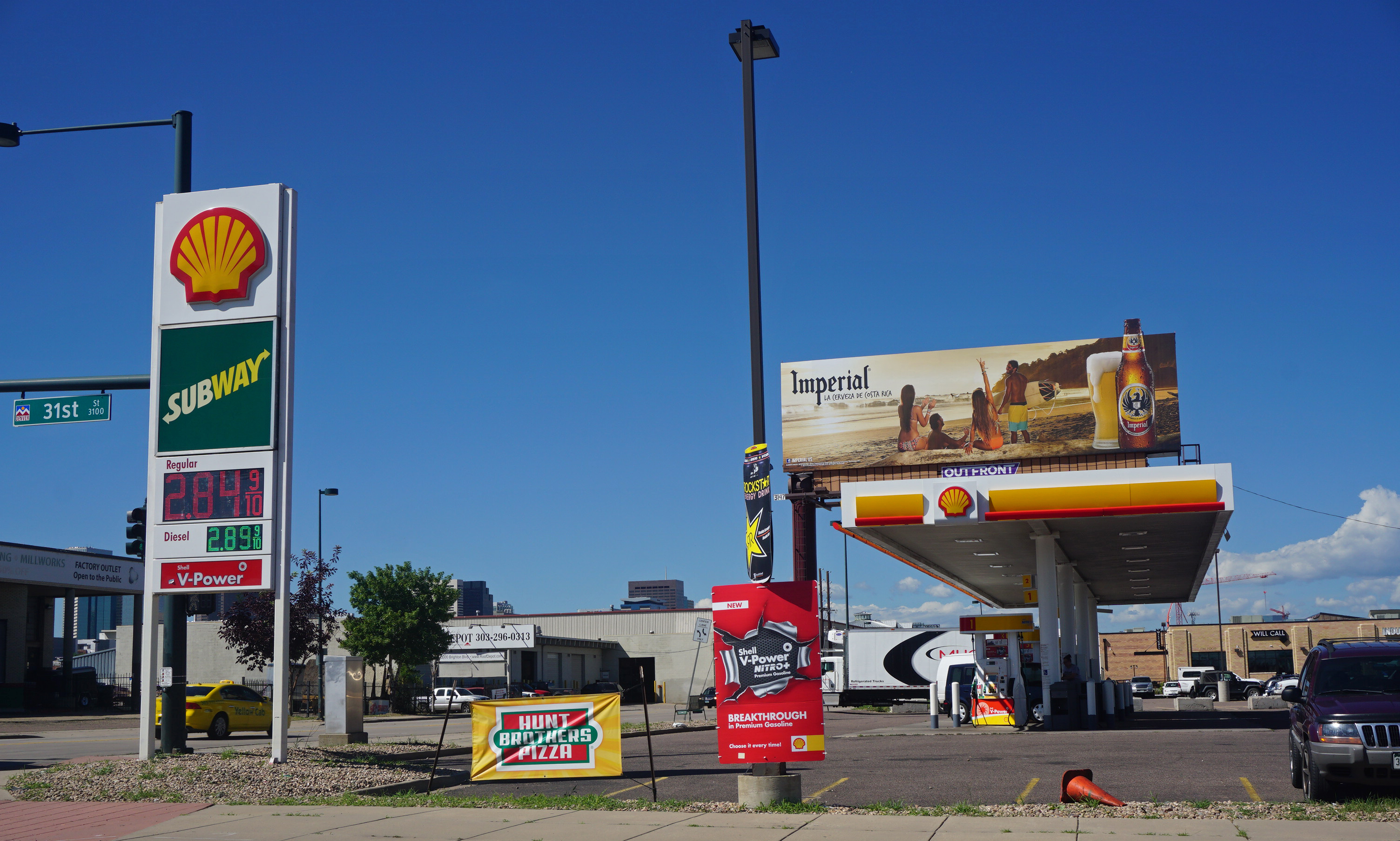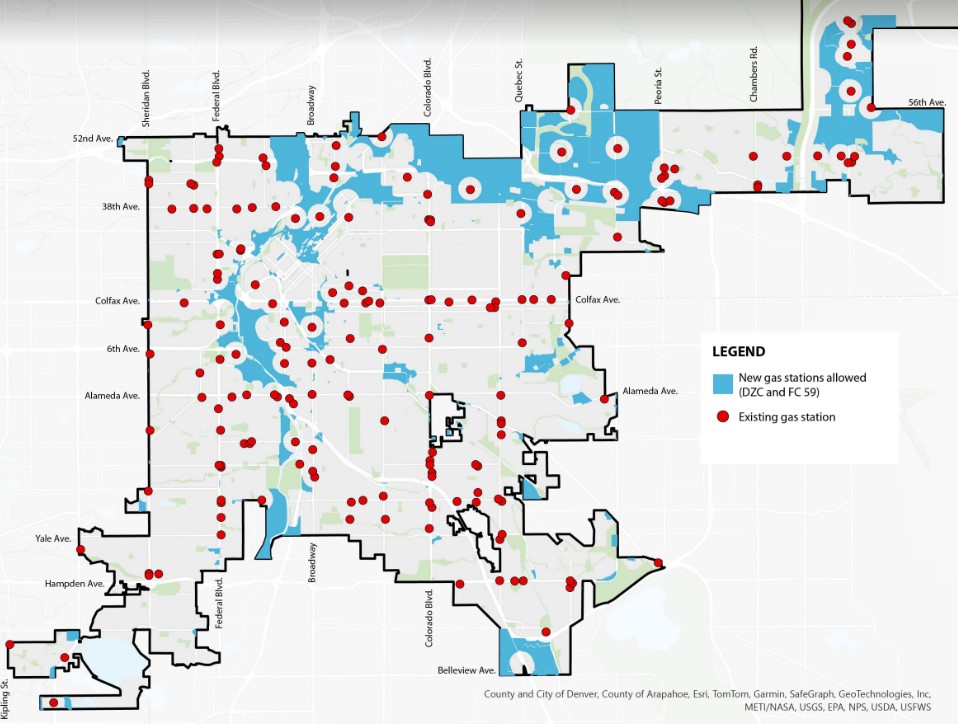
A gas station along Brighton Boulevard, seen in 2015. (BusinessDen file)
The Denver City Council voted Tuesday to significantly limit where new gas stations can be built, a move that scuttles several projects in the works and could lead to litigation.
The zoning amendment, which bars new gas stations within a quarter mile of existing stations or rail platforms, was approved by a vote of 12-1. Councilwoman Flor Alvidrez voted against it.
The measure also bars stations within 300 feet of certain residential zone districts. It was proposed by three council members: Amanda Sawyer, Diana Romero Campbell and Paul Kashmann.
They generally said Denver has enough gas stations, that gas stations pose environmental and quality-of-life concerns and that limiting new stations would preserve land for possible housing development.
The council opted not to make any changes to address a key concern brought by the real estate sector: the grace period.
The measure exempts only projects for which development plans had been submitted to Denver by May 13 — the day last year that the measure was first discussed. NAIOP Colorado, a prominent real estate trade group, has called the retroactivity “unconstitutional.”
“We disagree with that claim,” Anshul Bagga, a city attorney, told council members Tuesday.
QuikTrip, a Tulsa-based chain that has been in expansion mode locally, had also pushed for the change. The company was pursuing four projects in the city that it will no longer be able to build. They include ones at the Interstate 70-Pecos Street and Interstate 25-Yale Avenue interchanges and at the corner of Colorado Boulevard and Evans Avenue.
Owners of both the Yale and Evans properties, along with their attorneys, spoke at the meeting, requesting the May date be changed so QuikTrip could build at their sites. They said litigation might be necessary.
Councilman Kevin Flynn, who represents southwest Denver, was the first council member to show sympathy for their position.
“The retroactivity issue … troubles me. I wish it were not in the bill,” Flynn said.
But Flynn said he didn’t think there was enough support from his colleagues to justify proposing a change, and that he’d still be a yes vote.
“The overall goal of the amendment is something I support,” he said.
Alvidrez, who represents south-central Denver, also voiced concern about the retroactivity before voicing the sole no vote.
“I do really worry about what it’s like to do business with the city of Denver, and how unpredictable it can be,” she said.
Ahead of the vote, Kashmann derided the concerns voiced by property owners and QuikTrip.
“They tell compelling stories about property rights and stealing my investment, but they build projects not caring at all about the neighboring properties … None of these gas stations are the result of community meetings,” he said.
“These companies think of one thing: their bottom line … It is up to government to bring a social conscience into the mix. That is what we’re doing here.”

Where gas stations can be built following the passage of the measure. (City of Denver)

A gas station along Brighton Boulevard, seen in 2015. (BusinessDen file)
The Denver City Council voted Tuesday to significantly limit where new gas stations can be built, a move that scuttles several projects in the works and could lead to litigation.
The zoning amendment, which bars new gas stations within a quarter mile of existing stations or rail platforms, was approved by a vote of 12-1. Councilwoman Flor Alvidrez voted against it.
The measure also bars stations within 300 feet of certain residential zone districts. It was proposed by three council members: Amanda Sawyer, Diana Romero Campbell and Paul Kashmann.
They generally said Denver has enough gas stations, that gas stations pose environmental and quality-of-life concerns and that limiting new stations would preserve land for possible housing development.
The council opted not to make any changes to address a key concern brought by the real estate sector: the grace period.
The measure exempts only projects for which development plans had been submitted to Denver by May 13 — the day last year that the measure was first discussed. NAIOP Colorado, a prominent real estate trade group, has called the retroactivity “unconstitutional.”
“We disagree with that claim,” Anshul Bagga, a city attorney, told council members Tuesday.
QuikTrip, a Tulsa-based chain that has been in expansion mode locally, had also pushed for the change. The company was pursuing four projects in the city that it will no longer be able to build. They include ones at the Interstate 70-Pecos Street and Interstate 25-Yale Avenue interchanges and at the corner of Colorado Boulevard and Evans Avenue.
Owners of both the Yale and Evans properties, along with their attorneys, spoke at the meeting, requesting the May date be changed so QuikTrip could build at their sites. They said litigation might be necessary.
Councilman Kevin Flynn, who represents southwest Denver, was the first council member to show sympathy for their position.
“The retroactivity issue … troubles me. I wish it were not in the bill,” Flynn said.
But Flynn said he didn’t think there was enough support from his colleagues to justify proposing a change, and that he’d still be a yes vote.
“The overall goal of the amendment is something I support,” he said.
Alvidrez, who represents south-central Denver, also voiced concern about the retroactivity before voicing the sole no vote.
“I do really worry about what it’s like to do business with the city of Denver, and how unpredictable it can be,” she said.
Ahead of the vote, Kashmann derided the concerns voiced by property owners and QuikTrip.
“They tell compelling stories about property rights and stealing my investment, but they build projects not caring at all about the neighboring properties … None of these gas stations are the result of community meetings,” he said.
“These companies think of one thing: their bottom line … It is up to government to bring a social conscience into the mix. That is what we’re doing here.”

Where gas stations can be built following the passage of the measure. (City of Denver)


